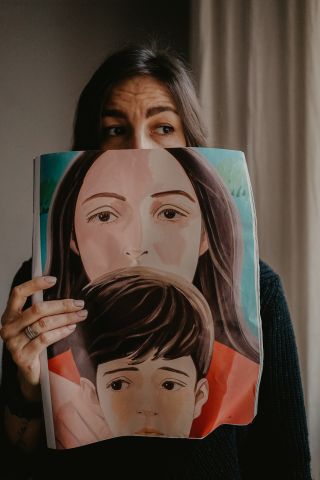Marriage
Losing the Masks That Prevent a Marriage From Growing
Learning to be our true selves can help our marriages.
Posted February 1, 2023 Reviewed by Ekua Hagan
Key points
- Masks help an individual show their selected strengths to the world while shielding their vulnerabilities.
- Being open to oneself is the first step in building trust in a relationship.
- Meditation is one of several ways that partners can learn to let go of the fear of doubt and uncertainty in their married lives.

"The obstacle is in our “self,” that is to say, in the tenacious need to maintain our separate, external, egotistic will. It is when we refer all things to this outward and false “self” that we alienate ourselves from reality and from God" (Merton, 1961).
Married people, particularly those coping with obsessive-compulsive disorder (OCD), often reveal a certain “face” to the public that differs from the true identities they tend to reserve for themselves and close family and friends. Thomas Merton (1961), a contemplative monk, wrote the epigraph above to remind us that we all wear “masks” to reveal only what we want to reveal to others in order to preserve our fragile egos. When we fearfully avoid vulnerability with ourselves and loved ones, the implications for marriages can be disastrous. In this post, I will review a few aspects of false selves that partners can use to strengthen their marriages: the nature of false selves and masks, trust issues, and dark nights of the soul.
The connection between false selves and masks
Sometimes, we try anything to establish and maintain a sense of control in our lives. Using masks can help us show our selected strengths to the world while shielding our vulnerabilities. Whereas the true self consists of the person intended by the creator or superior being, the false self is an idol we create ourselves to maintain a sense of control to avoid hate, fear, and insecurity (Beverley, 2004/2008). In a sense, we tend to create images, archetypes known as false selves, of ourselves to feel secure and stable—especially when we are not.
In our marriage, for example, I sometimes wear a mask of pride to appear strong and resolute on positions during disagreements with my wife—merely hiding my insecurity and self-doubt (Culkin & Culkin, 2021). I can actually feel the dissonance between what is really in my heart and what I convey at these times. By examining such contradictory situations through mindful activities such as meditation and/or prayer, we can “realize our brokenness—our sinfulness….[and then seek] mercy and healing” (Welch, 2022). Put another way, we can begin to heal our true selves and our relationships when we peel off the masks and confront our actual brokenness and need for forgiveness.
Trust issues
People with OCD have trust issues: with themselves, with others, and with the world. This distrust stems from a primal fear, often indescribable, of uncertainty or doubt. Studies indicate that habitual checkers have trouble trusting their short-term memories (Didonna, 2020). I can relate to this finding, given the many years I have looked just another time to ensure I haven’t left my keys, a project, or a book (see Culkin & Culkin, 2021).
This fear can lead to distrust in myriad areas of one’s life. For example, my scrupulosity prevented me from saying certain short prayers. I had to repeat them several times—sometimes for more than an hour—for them to somehow "count" with God. Anything that "contaminated" or interrupted the sanctity of the prayer session (from birds outside the window to creaking floorboards) resulted in me believing I had to restart the entire session. While I don’t think God intends prayer to be such a distressing experience, it certainly has been for me.
Dark nights of the soul
Wisdom reminds us that we are not in control of our lives, at least not as much as we’d like to be. Scholars and contemplative practitioners have described those times when experiences remind us of our lack of control, confusion of uncertainty, and questions of doubt as dark nights of the soul (May 2003). In this context, OCD can have a spiritual component.
When couples find ways to check their tendency to impose their will on every moment, they can recognize a sense of newfound freedom. Meditation is one of several ways that partners can learn to let go of fears of doubt and uncertainty in their married lives (Culkin & Culkin, 2021; Didonna, 2020). In particular, I write extensively about my experience with centering prayer as a contemplative means to pray while letting go.
Conclusion
Married couples can strengthen their relationships by examining a few aspects of their false selves: the nature of false selves and masks, trust issues, and dark nights of the soul. What masks are you wearing?
References
Beverley, J. (2004/2008). Creating Loving Relationships: Living a Life of Authenticity. Aurora Canyon Publishing.
Culkin, D., & Culkin, M. (2021). OCD and Marriage: Pathways to Reshaping Your Lives Together. Specialty Press, Inc. See https://www.ocdandmarriage.com
Didonna, F. (2020). Mindfulness-based Cognitive Therapy for OCD: A Treatment Manual. The Guilford Press.
May, G. (2003). The Dark Night of the Soul: A Psychiatrist Explores the Connection Between Darkness and Spiritual Growth. Harper One.
Merton, T. (1961). New Seeds of Contemplation. New Directions.
Welch, J. (2022). An Interior Life: Rummaging through the Christian Tradition. Paulist Press.


